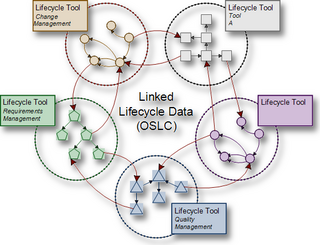Related Research Articles

Xandros, Inc. was a software company which sold Xandros Desktop, a Linux distribution. The name Xandros was derived from the X Window System and the Greek island of Andros. Xandros was founded in May 2001 by Linux Global Partners. The company was headquartered in New York City with its development office in Ottawa, Canada.
A software company is a business entity that specializes in the development, distribution, and maintenance of software products and services. These companies create a variety of software solutions, including commercial software, custom software, Software as a Service (SaaS), open-source software, and embedded software. They range from small startups to large corporations, engaging in activities such as software development, testing, deployment, and support.
IBM DevOps Code ClearCase (also known as IBM Rational ClearCase) is a family of computer software tools that supports software configuration management (SCM) of source code and other software development assets. It also supports design-data management of electronic design artifacts, thus enabling hardware and software co-development. ClearCase includes revision control and forms the basis for configuration management at large and medium-sized businesses, accommodating projects with hundreds or thousands of developers. It is developed by IBM.
HCL Sametime Premium is a client–server application and middleware platform that provides real-time, unified communications and collaboration for enterprises. Those capabilities include presence information, enterprise instant messaging, web conferencing, community collaboration, and telephony capabilities and integration. Currently it is developed and sold by HCL Software, a division of Indian company HCL Technologies, until 2019 by the Lotus Software division of IBM.
MKS, Inc is a subsidiary of PTC, Inc. It was previously a multinational independent software vendor that was acquired by Parametric Technology Corporation on May 31, 2011. MKS operated in the Application Lifecycle Management (ALM) and Systems Administration market segments.
WebSphere Application Server (WAS) is a software product that performs the role of a web application server. More specifically, it is a software framework and middleware that hosts Java-based web applications. It is the flagship product within IBM's WebSphere software suite. It was initially created by Donald F. Ferguson, who later became CTO of Software for Dell. The first version was launched in 1998. This project was an offshoot from IBM HTTP Server team starting with the Domino Go web server.

Mercury Interactive Corporation was an Israeli company acquired by the HP Software Division. Mercury offered software for application management, application delivery, change and configuration management, service-oriented architecture, change request, quality assurance, and IT governance.
A service delivery platform (SDP) is a set of components that provides a service(s) delivery architecture for a type of service delivered to consumer, whether it be a customer or other system. Although it is commonly used in the context of telecommunications, it can apply to any system that provides a service. Although the TM Forum (TMF) is working on defining specifications in this area, there is no standard definition of SDP in industry and different players define its components, breadth, and depth in slightly different ways.
CollabNet VersionOne is a software firm headquartered in Alpharetta, Georgia, United States. It was Founded by Tim O’Reilly, Brian Behlendorf, and Bill Portelli. CollabNet VersionOne products and services belong to the industry categories of value stream management, DevOps, agile management, application lifecycle management (ALM), and enterprise version control.
MyEclipse is a commercially available Java EE IDE created and maintained by the company Genuitec, a founding member of the Eclipse Foundation.
Aldon is a business unit of Rocket Software. It develops, manufactures, licenses and supports software change management products for the enterprise application lifecycle management (ALM) and software change management (SCM) markets.
Unified communications (UC) is a business and marketing concept describing the integration of enterprise communication services such as instant messaging (chat), presence information, voice, mobility features, audio, web & video conferencing, fixed-mobile convergence (FMC), desktop sharing, data sharing, call control and speech recognition with non-real-time communication services such as unified messaging. UC is not necessarily a single product, but a set of products that provides a consistent unified user interface and user experience across multiple devices and media types.
Proprietary software is software that grants its creator, publisher, or other rightsholder or rightsholder partner a legal monopoly by modern copyright and intellectual property law to exclude the recipient from freely sharing the software or modifying it, and—in some cases, as is the case with some patent-encumbered and EULA-bound software—from making use of the software on their own, thereby restricting their freedoms.

Linoma Software was a developer of secure managed file transfer and IBM i software solutions. The company was acquired by HelpSystems in June 2016. Mid-sized companies, large enterprises and government entities use Linoma's software products to protect sensitive data and comply with data security regulations such as PCI DSS, HIPAA/HITECH, SOX, GLBA and state privacy laws. Linoma's software runs on a variety of platforms including Windows, Linux, UNIX, IBM i, AIX, Solaris, HP-UX and Mac OS X.
Protecode was a private company based in Ottawa, Ontario, Canada that provided open source license and security management software used for software development license compliance.
OpenText ALM (Application Lifecycle Management) is a comprehensive solution designed to support and enhance the entire lifecycle of application development and management. It provides robust tools for planning, development, testing, deployment, and maintenance, ensuring that software projects are delivered efficiently and effectively.

Open Services for Lifecycle Collaboration (OSLC) is an open community, originally proposed in 2008, to define a set of specifications that enable integration of software development. It has evolved, and continues to evolve, to areas such as Application Lifecycle Management (ALM), Product Lifecycle Management (PLM), IT Operations and more. The intention is to make life easier for tools users and tools vendors, by making it easier for tools to work together.

DBeaver is a SQL client software application and a database administration tool. For relational databases it uses the JDBC application programming interface (API) to interact with databases via a JDBC driver. For other databases (NoSQL) it uses proprietary database drivers. It provides an editor that supports code completion and syntax highlighting. It provides a plug-in architecture that allows users to modify much of the application's behavior to provide database-specific functionality or features that are database-independent. This is a desktop application written in Java and based on Eclipse platform.
Eclipse ERP is a real-time transaction processing accounting software used for order fulfillment, inventory control, accounting, purchasing, and sales. It was created for wholesale distributors in the Electrical, HVAC, Plumbing, and PVF industries, but is used by a wide range of market sectors. At one point this software was called Intuit Eclipse DMS, and Activant Eclipse, and Eclipse Distribution Management System.
References
- ↑ "Genuitec looks to battle IBM Jazz with ALM product rollout, Paul Krill, InfoWorld, The IDG Network"
- ↑ "Genuitec expands Pulse provisioning system beyond tools to Eclipse distros, eyes larger software management role, Dana Gardner, ZDNet, CBS Interactive"
- ↑ "Pulse Announcement, eWeek, Darryl Taft, Ziff Davis Enterprise"